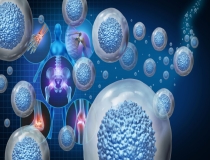Stem cells have a controversial history in the medical field thanks to their remarkable ability to transform and heal the body. Extensive studies have delved into stem cells and the way they work, and while science has proven that stem cells are an extremely useful tool in medical research and treatments, there is still much debate about the ethics behind where stem cells come from and how they are used.
So, where do stem cells come from, and why are they used in the medical industry for various treatments?
A Closer Look: Where Do Stem Cells Come From?
Stem cells are unique cells found throughout the body that have the potential to develop into various types of cells, and they are present in many different tissues and organs.
Stem cells are unique because they can self-renew and differentiate into specialized cell types. They are crucial for tissue repair and regeneration, making them a powerful tool for medical research and treatments.
Two primary types of stem cells are harvested and used in stem cell research: adult stem cells and embryonic stem cells.
Where Do Adult Stem Cells Come From?
Adult stem cells are known as the less controversial type because they are harvested from adult tissue and organs. So, where do adult stem cells come from?
In humans, you will find adult stem cells in the brain, blood, skin, and bone marrow. However, studies on animals have shown that adult stem cells can be found in a wide range of tissues, including:
- Cornea
- Digestive system
- Liver
- Pancreas
- Retina
Where Do Embryonic Stems Cells Come From?
Embryonic stem cells are the most controversial type because of where they are harvested. Where do embryonic stem cells come from? Medical scientists harvest them from early-stage embryos. These cells are known as pluripotent stem cells and are extracted from the embryo’s inner cell mass. These cells can potentially develop into other cell types, including more stem cells, making them useful for research.
How Are Stem Cells Used?
Stem cells offer the scientific community an exciting opportunity to study how our bodies work and discover new ways to help treat injuries and diseases. Since these specialized cells have the unique ability to grow into different cell types, they have the potential to be applied in a wide variety of applications, from treating diseases to healing tissues.
Cell Therapy for Tissue Regeneration
Stem cells are integral in cell therapy treatments designed to help tissue regeneration. These treatments involve harvesting stem cells from the patient’s own body and using them to replace damaged or diseased tissue.
This process is done by taking a small sample of the patient's blood and separating the stem cells from the blood using a machine called a centrifuge. Once the stem cells are separated, they are then injected into the treatable area, where they will differentiate into the appropriate cells needed to help repair the damaged tissue.
This practice has been studied at length and has proven beneficial for many, especially in patients with orthopedic injuries. Harvested cells can help regenerate damaged tissues such as:
- Bone
- Cartilage
- Ligaments
- Muscle
- Tendons
Regenerative cell therapy has proven beneficial in orthopedic injuries, athletic injuries, and even cosmetic surgery.
Some common injuries that benefit from this treatment are ligament tears in athletes. When a ligament tears, the body reacts by trying to heal it on its own. This can result in a host of problems, including scar tissue formation, chronic pain, and even instability. Stem cell therapy can be used to help regenerate the torn ligament and help avoid the issues associated with it.
Disease Treatment
Stem cells have been studied extensively for their potential use in treating various diseases and disorders. They can be used to replace damaged or diseased cells and can even be used to create new organs for transplantation.
Stem cell research has the potential to revolutionize healthcare, as it could provide treatments for conditions that are currently untreatable. Scientists are currently studying the potential applications of stem cell research, from curing cancer to regenerating tissue to creating new organs. The possibilities are endless, and stem cell research is sure to revolutionize healthcare in the coming years.
Cell Therapy with Chicago Stem Cell Therapy & Regenerative Medicine
The potential applications of stem cell research are vast. The possibilities have already proven to be well worth its applications in millions of patients globally.
For the Chicago Stem Cell Therapy & Regenerative Medicine team, we get to see this firsthand with the success we've seen with our patients. Cell therapy has proven beneficial for many, from regenerating tissue to helping patients combat chronic diseases and illnesses to assisting patients in healing faster after surgery or injury.
Would you be a good candidate for stem cell therapy? Contact our office today to schedule your consultation.


 Thanks a lot for getting my hip right. Looking forward to a full recovery and a great season. Thanks again for everything.
Thanks a lot for getting my hip right. Looking forward to a full recovery and a great season. Thanks again for everything.










